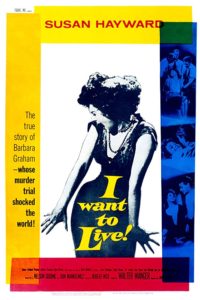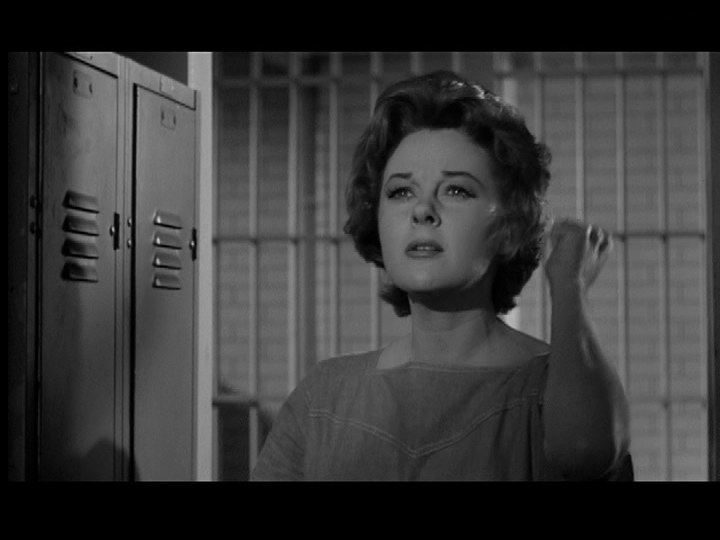I Want to Live! (1958)
“Just this once, I wish it wasn’t ladies first.”
|
Synopsis: |
|
Genres, Themes, Actors, and Directors:
Review: As depicted by Hayward in this film, Graham has “volcanic energy” and is “always moving about, dancing (she loves jazz), hugging and kissing men, mingling with her wild crowd… She takes her lumps, willingly making sacrifices and taking raps for irresponsible men, even going to jail on their behalf.” Meanwhile, “because she is a woman on death row, she is big news, and is exploited unmercifully”, though she’s a “tough cookie [who] doesn’t crack”. Peary argues that while Hayward “is convincing showing the gutsy, rough side of Graham”, “some of her finest moments come when Graham calms down and speaks forthrightly to someone she is fond of”: while “all the men in the picture seem to have conspired against her” (at least “until late in the film”), she does have “some well-played, tender scenes with women”. Ultimately, as Peary argues, “Hayward’s heartfelt performance in the last few scenes makes us see the cruelty and criminality of the death penalty, as well as the lack of dignity accorded to those who are about to lose their lives.” With all that said, this isn’t an easy film to watch by any means, especially knowing Graham’s outcome from the start; I recommend watching it once for Hayward’s performance, but not feeling any obligation for a revisit. Redeeming Qualities and Moments: Must See? Categories
Links: |



One thought on “I Want to Live! (1958)”
Not must-see – though it has value as a statement against capital punishment.
Here we go again with the Hollywood version of ‘the true story’. Wise’s film makes a huge effort (at the opening of the film and at the end) in telling its viewers that it’s “factual”. Yet there appears to be considerable evidence that the film is largely a cheat.
This from Wikipedia:
Hollywood writer Robert Osborne, who later became the host of Turner Classic Movies, interviewed Hayward and asked whether or not she believed Barbara Graham had been innocent. According to Osborne, the actress seemed hesitant to answer at first, but ultimately admitted that her research on the evidence and letters in the case led her to believe that the woman she played was guilty.
This from IMDb:
As a reporter for the Los Angeles Daily Mirror, Gene Blake covered every day of Barbara Graham’s murder trial, and witnessed her execution and the executions of Santo and Perkins. He called this movie “a dramatic and eloquent piece of propaganda for the abolition of the death penalty.” He further stated that the film ignored “…the wealth of evidence which convinced 12 conscientious jurors beyond a reasonable doubt that Mrs. Graham was guilty and should die for a most despicable crime, the brutal and senseless murder of a 62 year-old crippled widow, Mrs. Mabel Monahan.”
Wise’s film makes a very suspicious error in revealing as little about the murder as possible. Hayward’s Barbara goes so far as to say she never even met the victim. (This puts the film in direct opposition to something like Brooks’ ‘In Cold Blood’.) If audiences know nothing about the details of the murder, it’s quite easy to show the one condemned as a pawn in the judicial system. As well, if Graham had been shown as guilty, it would rob the film of any kind of suspense. Presenting her as innocent puts the audience on the edge of its collective seat – as the hope of acquittal remains.
Re: the actual script, I don’t personally find it all that authentic-sounding overall. There’s a good sequence here and there but mostly it seems to be trying too hard to be ‘tough and gritty’, without sounding all that real. I can’t really knock Hayward’s performance but there’s much she has to overcome when it comes to what she’s asked to say. Much of it sounds forced or hokey.
I get the impression that, as a storyteller, Wise was much more interested (rightfully so) in showing the cruelty of capital punishment. In that, he succeeds. But he has also given us a film that largely just plods along to its (admittedly) hard-hitting conclusion.